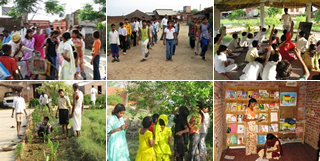Vikas Trust
Striving to Ensure Social Justice
Emergence
The conditions of poverty and deprivation of child labourers and their families in Firozabad district deeply impressed Dilip Sevarthi who was discontented and dissatisfied with their living conditions. He was disturbed after seeing their pathetic inhumane conditions while working in the factories. In 1991 he started a movement against child labour and child slavery and started holding meetings among the adult labourers for making them aware of their exploitation. He initially started the campaign alone but later he involved like-minded people in the campaign to make it a success.
Sevarthi gave a shape to the campaign by holding rallies and open meetings with the involvement of various civil citizens, parents, religious clerics, etc., to let them pay attention to growing problems and miserable conditions of child labour in the district. In every meeting and his speech, he strongly emphasized on Child Labour Prohibition Act,1986, and various Articles of the Indian Constitution (39, 41, 19, 24, etc.), to make the people aware of different legal provisions which pronounce that practising child labour in any form is punishable.
Along with it he spread awareness in the areas of Firozabad glass and bangle works through foot marches and cycle rallies from time to time. Gherao of all the officials from commissionaire and the district offices concerned was made for the elimination of child slavery and demand was made for the enforcement of laws relating to child labour elimination. Meanwhile in December 1996, the Hon'ble Supreme Court of India gave the landmark judgement in the most famous case of MC Mehta vs. Government of Tamil Nadu. Even after this decision, Firozabad administration was not active and it did not take any action. It took Sevarthi to fast unto death at the office of the District Magistrate on February18, 1997. "Neither the government, nor the administration is doing anything in accordance with the Judgement of the Hon'ble Supreme Court. Until the Judgement of the court is put into action, I shall go on fast unto death." This information from Sevarthi was send to all the departments.
The same day, thousands of children, men and women seated with Sevarthi on the stage for fast after lodging him with garlands and assuring him of full cooperation. No person from the administration visited him. All of a sudden, on the night of 19th February, a fatal attack was made on all of them, in which he was badly injured. The attack was made by the Police Force at the instance of NK Paliwal, the then ADM of Firozabad.
In its enquiry, National Human Rights Commission found that BK Gupta, a senior officer from the district, District Magistrate, CMO and Superintendent of Police were involved in the attack on Sevarthi. Afterwards, a report against Sevarthi was registered under sections 147, 332, 323, 352 and 504 and for this reason he was jailed for one week and later on released on bail with the help of his well-wishers.
As soon as Sevarthi came out of the Jail he was welcomed by the parents of labourers, children and workers of other social organisations and promised him of their full cooperation. He got the moral support to lead forward the fight against child slavery and other labourers. On March 10, 1997, Sevarthi reached Firozabad and called upon the adult labourers to completely close down the factories and decided to observe a protest again at the office of the District Magistrate.
Upon his call, all the factories of Firozabad and some of the markets remained closed on that day. In spite of massive police force deployed by the District Magistrate, thousands of child labourers, their guardians and adult labourers gathered around the office of the district magistrate. In his address, Sevarthi advised to keep them restrained and then he issued a memorandum in the name of the Prime Minister.
The greatness of Dilip Sevarthi did not end here; he became the great personality at the international level by setting number of illustrations before the society to practice as the best humans. Dilip Sevarthi not only preached the social principles but also he practiced in his life to set apart himself from others so that the people can follow him and can contribute in the country’s development. The prevailing pathetic and pitiable situations of the most deprived, exploited and distress people of the society has forced Dilip Sevarthi (a reputed, famous, recognized social worker and honored with many awards) and his wife Respected Mrs. Sarita Dilip and other like minded people to establish Vikas Trust in Uttar Pradesh.
This couple had also decided to dedicate their whole life to the societal causes of development except the little time to bring up their cute baby. This couple strongly admits that the battle of socio-economic freedom has yet to be won for the dignified life of weaker sections, scheduled castes, most backward classes and the deprived people of the society, which cannot be possible only by the professional weapons.
Vikas Trust is not an organization but a dream of Dilip Sevarthi & Sarita Dilip set up to bring back the human dignity, equality and holistic freedom of men, women and children especially the child labourers. Their dream came true when Vikas Trust was formed on 11th February 2004. Vikas Trust is a registered under the Indian Trust Act, 1882.
Registration Details
- Registered under the Indian Trust Act, 1882, with Registration no.1075, dated February11, 2004
- Registered under Foreign Contribution Regulation Act,1976, with Registration no. 137190007
- Registered under 12A A and 80 G of Income Tax Act, 1961
